
Art Therapy
“One of the basic rules of the universe is that nothing is perfect. Perfection simply doesn’t exist…..Without imperfection, neither you nor I would exist” ― Stephen Hawking



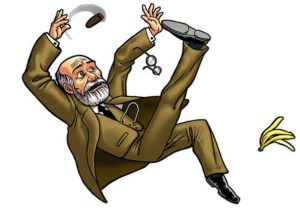
Many years ago, I encountered a question on a American-style psychology exam. Freudian Slip – is: and one of the answers was “Mrs. Freud’s slip.” I must say that one of the best “slips” I have encountered lately was the one from the former cultural minister in Israel, Miri Regev, who was interviewed when she had to leave her position. It is in Hebrew, and you can listen by clicking on her name above, but here is my free translation: “I have created a revolution in the cultural environment that even the next two ministers will not be able to fix.” For once she said the truth. That is the nature of a Freudian slip, it inadvertently brings out the truth that we have suppressed even from ourselves. This week we are celebrating the establishment of a new government in Israel. A young and vibrant government, with the greatest number of women in it so far, and including for the first time some differently-able women. One uses a wheel chair and one is deaf. It is actually a real asset to be deaf in the Israeli parliament, judging from the bedlam at the inaugural speech of the new prime minister.
For the first time in many years, I feel hope despite the uncertainty we live in. From the time we are born, we realize how uncertain the human condition is. We need to belong, to bond, to feel loved, and a part of a social group in order to diminish uncertainty. However, uncertainty is a given in the world, and ignoring it will not make it easier for us to live with. Circumstances change constantly, and flexibility of response is key to reducing the stress that uncertain circumstances create in our body. It is we, after all, who interpret any situation according to our experiences and deep-seated beliefs. New circumstances naturally bring up fears or hopes about the impact they will have on our lives. Whether the new situation represents a gain or a loss depends in large part on our perception. We do not control the changes; we can only control our reactions to them. Thus, in order to feel safe, we have to trust that the new people in power will act in ways that will benefit our safety and increase certainty in uncertain circumstances.
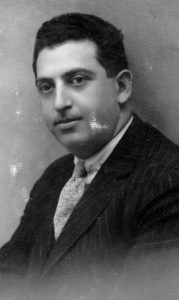 However, there are some constants in our lives, and one of them is celebrating Father’s Day, which is today. It is interesting that just by designating a time, like Father’s Day, Mother’s Day, Family Day, Memorial Day, Independence Day, etc. we are programed to act and perform according to the culture we grew up in. We send greeting cards, buy presents, go out for lunch or another favorite activity of the men in our lives, or somehow suddenly think about our own dearly-missed long-dead father. It is true, today I was reminiscing about that complex man who played such an important role in my life. When I think back, he was multiple people to me during the 24 and a half years we spent together. Actually, I hardly knew him for the first almost 5 years of my life. Those were traumatic years for my family, my community, and the world. When we were reunited, we did not have a common language any more. I’d managed to forget all the other languages I’d known, and spoke only Hebrew, which was the language of my new country, while he only spoke the old languages. Mother was at work, since he was not well, and I was alone at home with him. I wanted my rags to create a rag doll to play with, and asked him where they were. He looked at me with sad eyes that said “Please help me understand what you need, I love you” so I obliged. I went over and took his shirt out of his pants and told him “When this is torn, it is a rag” Lo and behold, he found my rags, and I found my father who knew how to listen, and then talk as well. And boy oh boy he could talk!
However, there are some constants in our lives, and one of them is celebrating Father’s Day, which is today. It is interesting that just by designating a time, like Father’s Day, Mother’s Day, Family Day, Memorial Day, Independence Day, etc. we are programed to act and perform according to the culture we grew up in. We send greeting cards, buy presents, go out for lunch or another favorite activity of the men in our lives, or somehow suddenly think about our own dearly-missed long-dead father. It is true, today I was reminiscing about that complex man who played such an important role in my life. When I think back, he was multiple people to me during the 24 and a half years we spent together. Actually, I hardly knew him for the first almost 5 years of my life. Those were traumatic years for my family, my community, and the world. When we were reunited, we did not have a common language any more. I’d managed to forget all the other languages I’d known, and spoke only Hebrew, which was the language of my new country, while he only spoke the old languages. Mother was at work, since he was not well, and I was alone at home with him. I wanted my rags to create a rag doll to play with, and asked him where they were. He looked at me with sad eyes that said “Please help me understand what you need, I love you” so I obliged. I went over and took his shirt out of his pants and told him “When this is torn, it is a rag” Lo and behold, he found my rags, and I found my father who knew how to listen, and then talk as well. And boy oh boy he could talk!
To this day I use his stories and jokes, which he was able to produce for every situation. The stories were humorous, but with wisdom in them. He told stories about his adventures, his growing up with a brother and 3 sisters, with a father who spoke, wrote, and read 11 languages, who had traveled the world and was a jeweler and watchmaker, since he flunked the apprenticeship as a barber. I have no idea if he invented the stories or they were true, but the way he told them always fit the occasion. Like when we had some wine that was not the best, and he recalled the time he was in Italy during the first world war. He was an officer in the Austro-Hungarian Army. They had just conquered a village in Italy, and wanted to have some of the village’s famous wine. The locals told them that the winemaker had died and no one could produce the same quality. Then they found the old man’s boots, and used them to stomp on the grapes. The resulting wine was served to them, and indeed it was perfect. After he finished telling the story, he said “That wine we just drank, lacked the old boots.”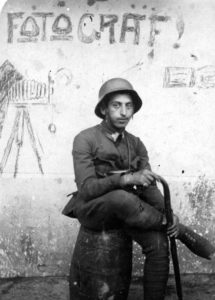
We did not have much, but he was creative and used whatever was around. We lived surrounded by orange orchards, and he built our table, chairs, and cupboards from orange crates. I used to tag along and he taught me to use hammer and nails, to hand him wood, and to hold the parts while he put things together. And when we finished a project, he would make me stand on his feet and dance the waltz with me. Back in the day my parents danced in waltz competitions. When things where a bit better, we even managed to get a radio, and then we could really dance to music. He sang well, and I learned all the old Hungarian and German songs from him. As he got better in Hebrew, I also regained my language prowess in German and Hungarian, with a smidgen of Rumanian. His knowledge of Turkish actually saved our lives, but I will leave that story for another time.
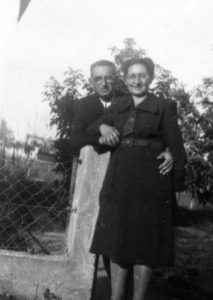 With improved health he also started working, and I started school. He really was a social worker without ever having studied it. He was compassionate, and alleviated pain with humor. He was a natural leader. He was like a father of a community of new immigrants who were housed in huts near us. He was the go-to person for rent, health, and family disputes. Our home was always open, and he was always available to lend an ear, and sometimes put his hand in his pocket to give something that he himself had little of. Without noticing, I absorbed many of his attributes. In fact, I realize now how much of my actions and values I owe to him (and perhaps even my sense of humor!).
With improved health he also started working, and I started school. He really was a social worker without ever having studied it. He was compassionate, and alleviated pain with humor. He was a natural leader. He was like a father of a community of new immigrants who were housed in huts near us. He was the go-to person for rent, health, and family disputes. Our home was always open, and he was always available to lend an ear, and sometimes put his hand in his pocket to give something that he himself had little of. Without noticing, I absorbed many of his attributes. In fact, I realize now how much of my actions and values I owe to him (and perhaps even my sense of humor!).
When my brother died, my father carried his grief into his body. But he did not let it stop him from being there for others. I was also there for him when he was sick. I was there to play Rummy with him, and when I did not feel like playing, he played solitaire. The crossword puzzle was the first thing he went to in the newspaper, and he was full of pride and happiness when he managed to finish it in under 15 minutes. I will never forget the Friday night get-togethers with a gipsy violin player, friends, and shared laughter. Toward the end, in the hospital, he stubbornly insisted that I go home and rest since I was pregnant, and he was feeling so much better that day. When the phone rang at 4 in the morning, I knew we would not meet again.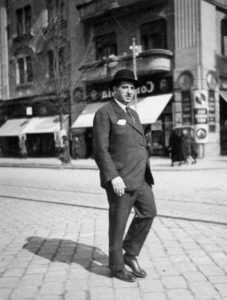
Happy Father’s Day, Dad – thanks for being you.